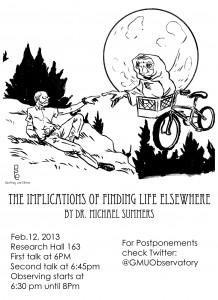The next talk of the semester as part of George Mason Observatory’s ‘Evenings Under the Stars’ series (where you’ll also get to look at awesome galaxies, stars, planets and more through our 0.8 meter telescope!) will be ‘The Implications of Finding Life Elsewhere’ by Michael Summers. Come to the lobby of Research Hall at George Mason University. As always the event is free and everyone is invited!
Some details about the event: Tuesday 12 February 2013: 1st talk at 6PM, same talk at 6:45PM, observing starts at 6:30PM until 8PM Directions to GMU and Research Hall here: http://eagle.gmu.edu/map/fairfax.php Zoom in to find Research Hall next to engineering building and York River Rd. Just keep an eye out for weather – the talk will be held even if observing has to be cancelled because of weather – updates will be available here – Observatory Twitter
Now a little bit about the talk and our speaker!
Recent planetary research has shown that environments which are habitable for simple bacteria are numerous, even in our own solar system. And studies of Earth history have shown that life originated on Earth almost immediately after it became habitable. Our scientific capability for direct exploration of other planets in the search for life, and for discovering extra-solar planets, is increasing at an exponential rate. Over 800 confirmed extrasolar planets are now known, and with telescopes planned for the next decade many thousands more will be discovered. This is the golden age for the discovery and study of extrasolar planets. It is possible that habitable planets may be common in the universe – possibly more common than stars, if we include habitable moons of gas giant planets. The discovery of even the simplest form of life on another planet would have profound scientific, philosophical, religious, and societal implications. We are on such a steep discovery curve in astrobiology that the detection of ET life could occur in the very near future.
Michael E. Summers is a planetary scientist who specializes in the study of structure and evolution of planetary atmospheres. His planetary research has dealt with the chemistry and thermal structure of the atmospheres of Io (one of the Galilean moons of Jupiter), Titan (largest of Saturn’s moons), Uranus, Neptune, Triton (largest moon of Neptune), Pluto, and Mars. Dr. Summers’ research on the Earth’s atmosphere has focused on understanding middle atmospheric ozone chemistry, coupled chemical-dynamical-radiative modeling of active trace gases, heterogeneous chemistry on meteor dust, the influence of solar variability on the state of the stratosphere and mesosphere, and polar mesospheric clouds and their connection to climate. He is the Director of the School of Physics, Astronomy and Computational Science at George Mason University.




 Additional questions and feedback on the Observatory site can be addressed to:
Additional questions and feedback on the Observatory site can be addressed to: